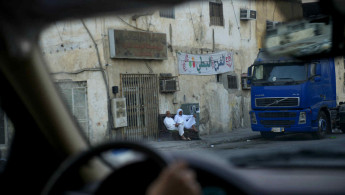Saudi soldier killed as eastern province unrest continues
A Saudi soldier has been killed in an RPG attack in the restive town of Awamiya, in the kingdom's eastern Qatif province, according to media reports on Tuesday.
A spokesman from the country's interior ministry said that the soldier was struck whilst on patrol in the al-Mansoura district.
Five other soldiers were injured in the attack, according to a statement from the state-affiliated Saudi Press Agency.
Reconstruction projects began in al-Mansoura last week – where some houses are more than 100 years old – as part of a project to transform the neighbourhood into a commercial district replete with gardens, shopping centres, restaurants, and a cultural centre.
However, they have been met with opposition from Shia militants in the area. The reconstruction plans involve the demolition of 488 residential units.
At least two other people – a two-year-old Saudi boy and a Pakistani national, both civilians – have been killed in Awamiya in the past week, according to an official statement from Saudi Arabia's interior ministry.
Local media has put the death toll higher.
Saudi Arabia's eastern province contains a large Shia minority, many of whom feel persecuted.
Since the wave of protests that swept through the Arab World in 2011 – typically called the Arab Spring – the region has witnessed sporadic outbreaks of violence pitting local protesters against the Saudi state.
Awamiyah was also the home of influential Saudi Shia cleric Nimr al-Nimr who was controversially executed on terrorism charges by Riyadh last year.
His death sparked demonstrations among Saudi Arabia's Shia population, evoked international condemnation, and lead to a frosting of relations between Riyadh, and Iran's clerical regime.
In its aftermath Tehran notably issued a ban forbidding its citizens to attend last year's Hajj pilgrimage to Saudi Arabia.
Riyadh's prospective demolition project in Masoura has notably been criticised by the UN which has called for it be halted.
A UN report in April pointed to the area's rich cultural heritage, describing its architecture as "unique" while also accusing Riyadh of attempting to forcibly remove residents without providing adequate resettlement options.





 Follow the Middle East's top stories in English at The New Arab on Google News
Follow the Middle East's top stories in English at The New Arab on Google News
![The UAE is widely suspected of arming the RSF militia [Getty]](/sites/default/files/styles/image_330x185/public/2024-11/GettyImages-472529908.jpg?h=69f2b9d0&itok=Yauw3YTG)
![Netanyahu furiously denounced the ICC [Getty]](/sites/default/files/styles/image_330x185/public/2024-11/GettyImages-2169352575.jpg?h=199d8c1f&itok=-vRiruf5)
![Both Hamas and the Palestinian Authority welcomed the ICC arrest warrants [Getty]](/sites/default/files/styles/image_330x185/public/2024-11/GettyImages-2178351173.jpg?h=199d8c1f&itok=TV858iVg)